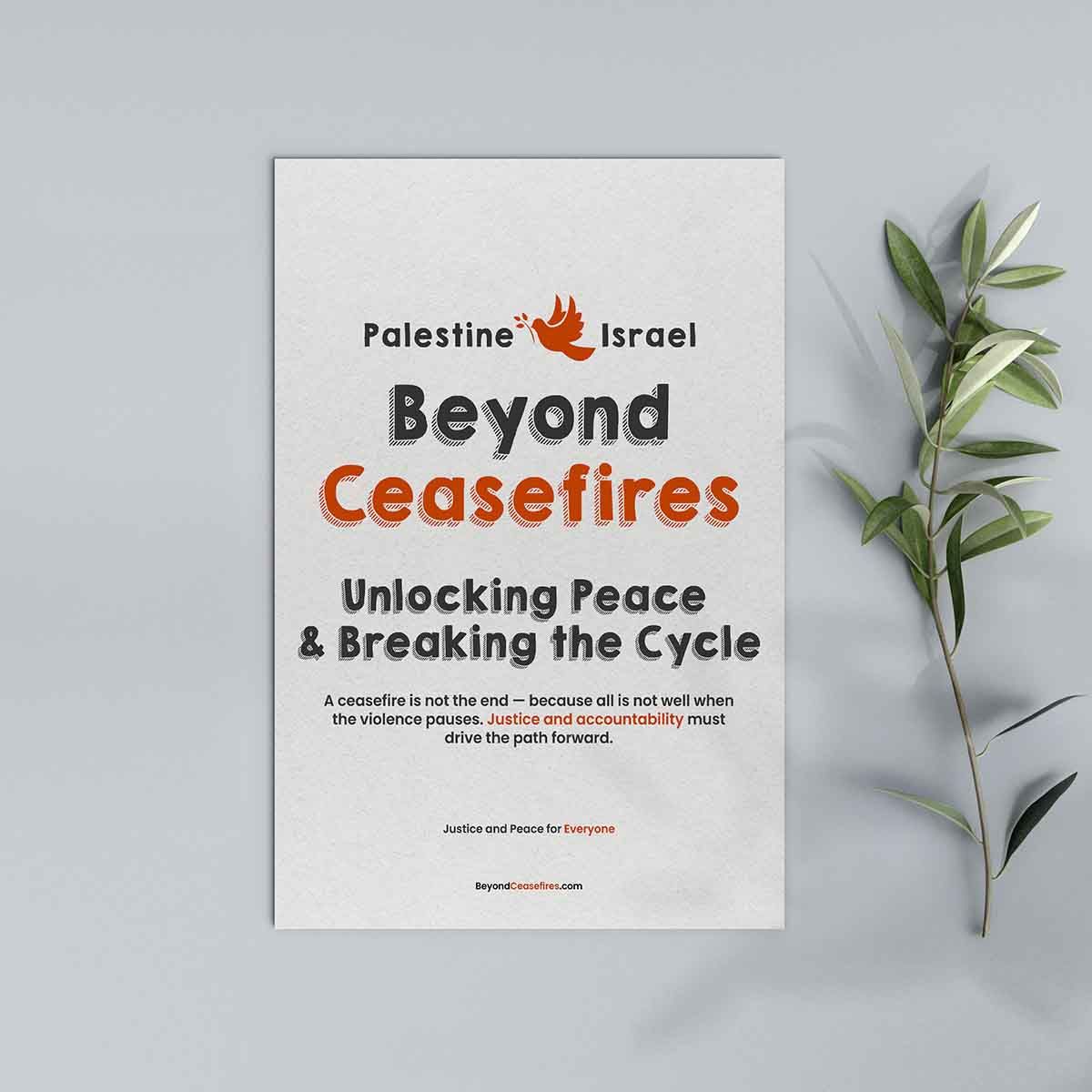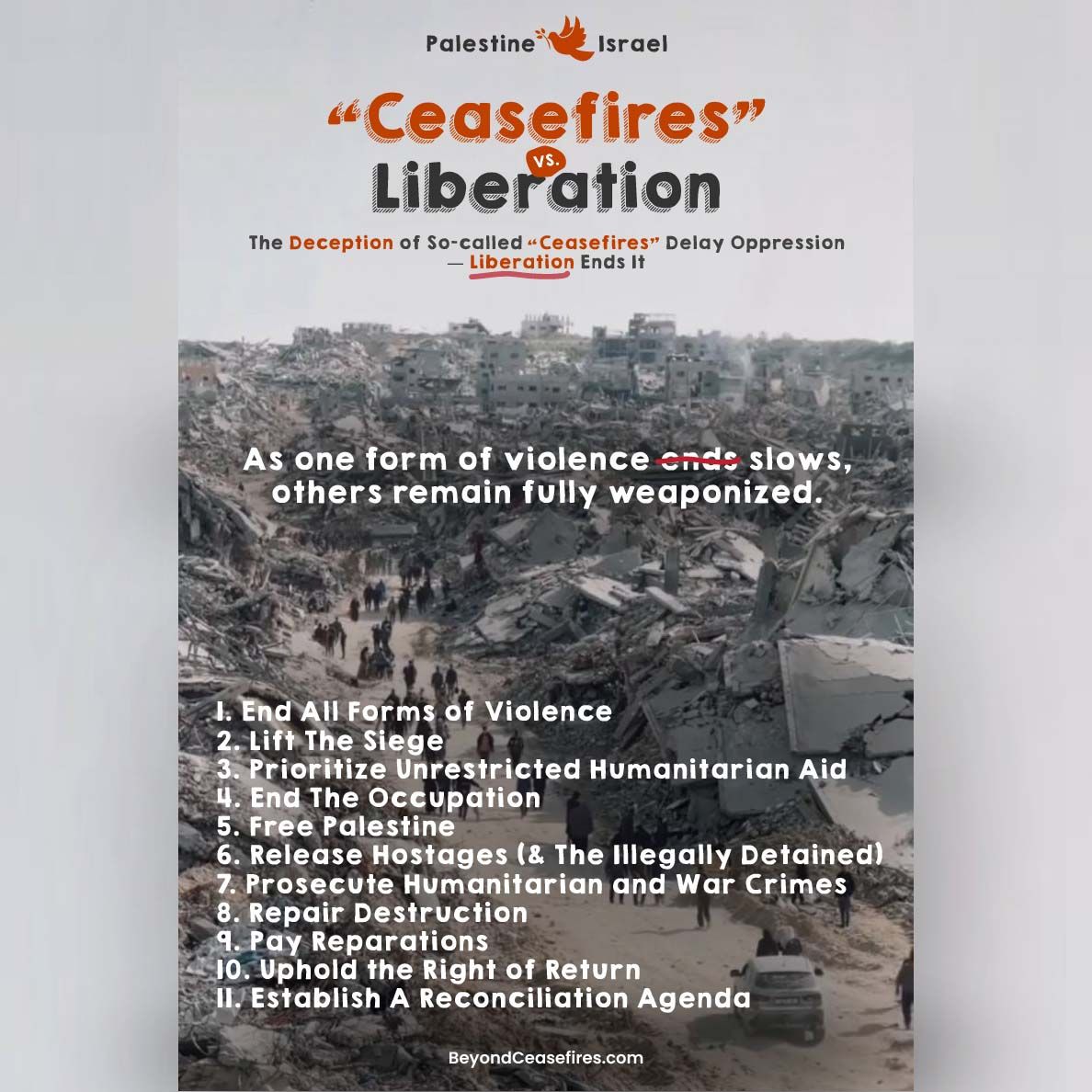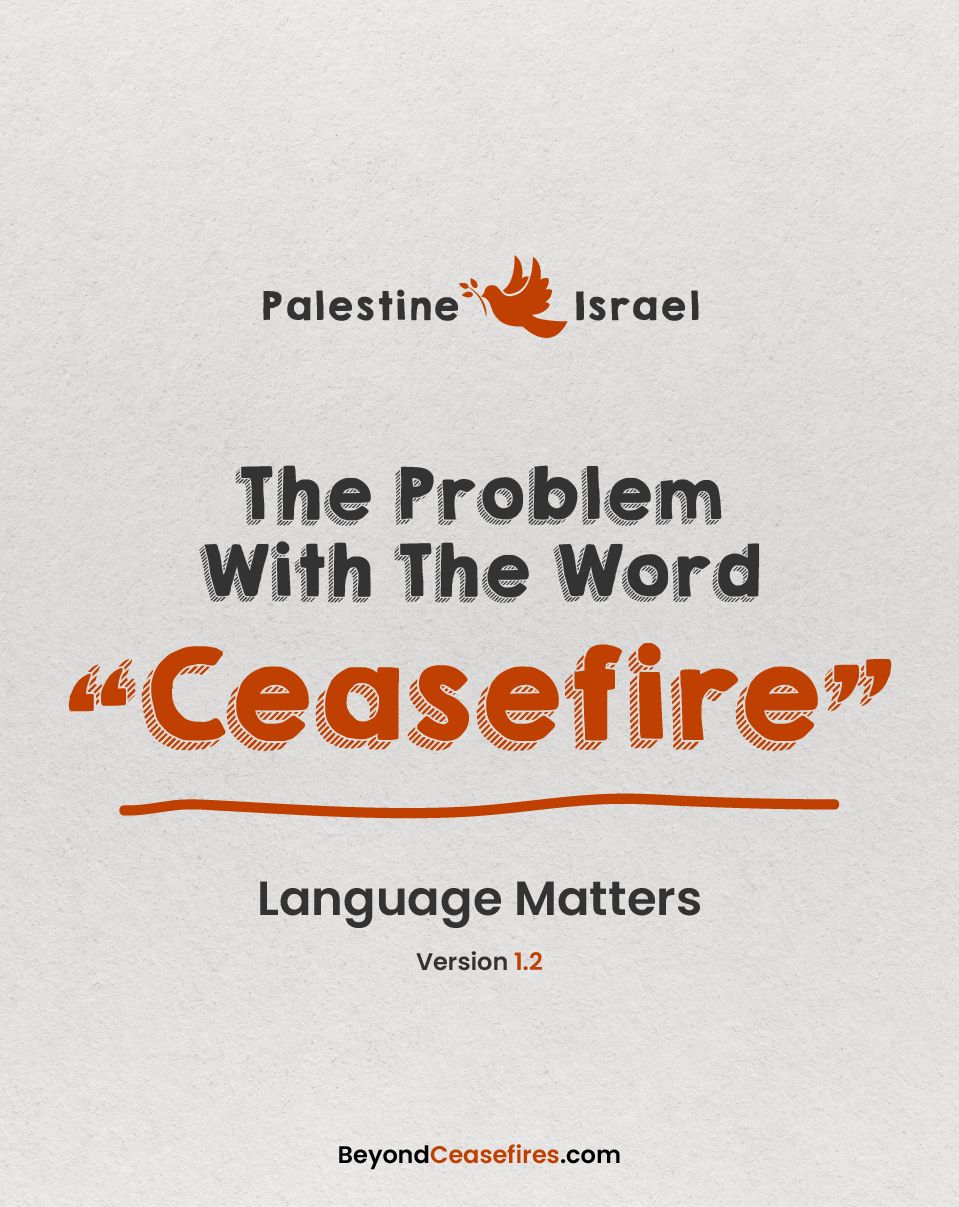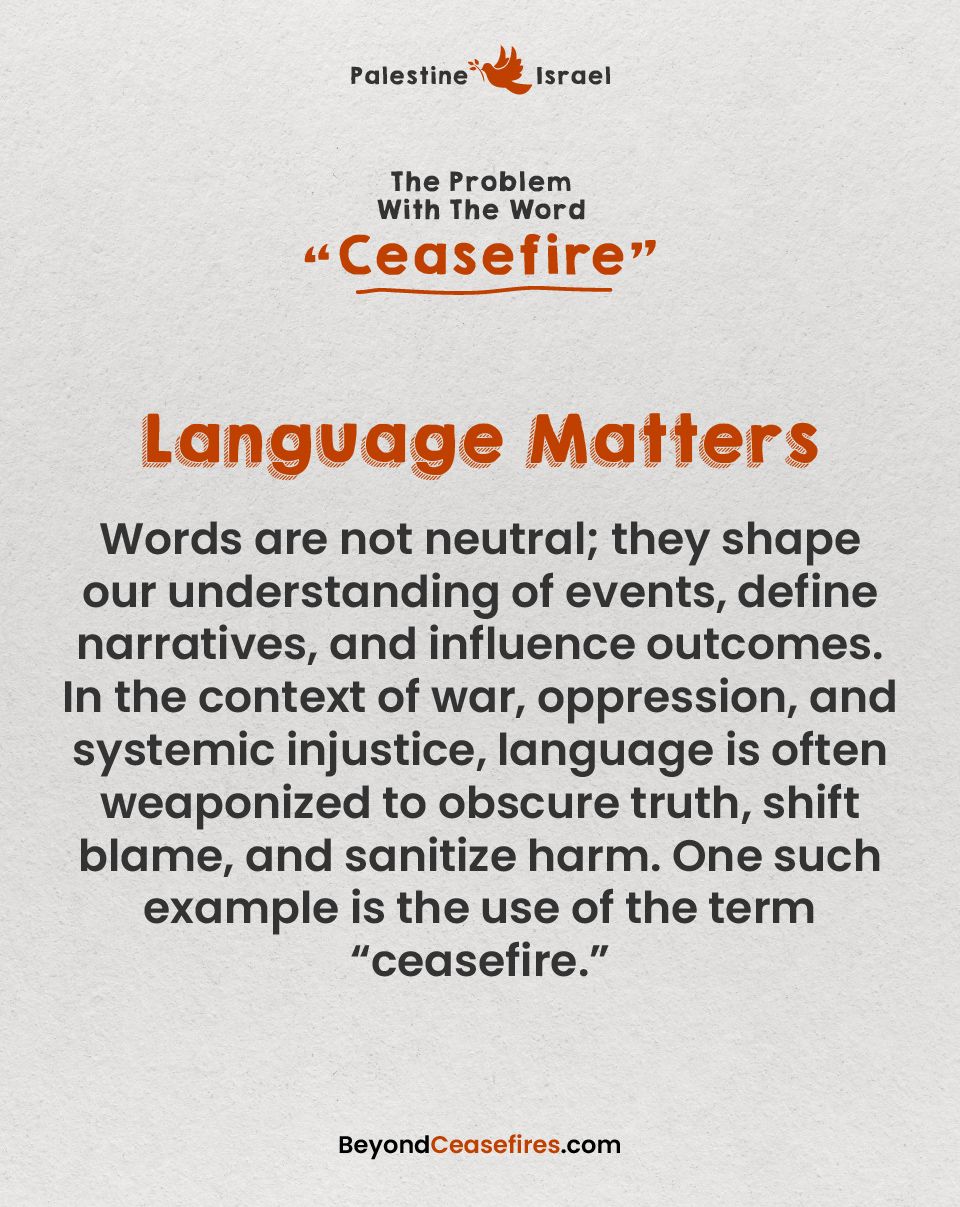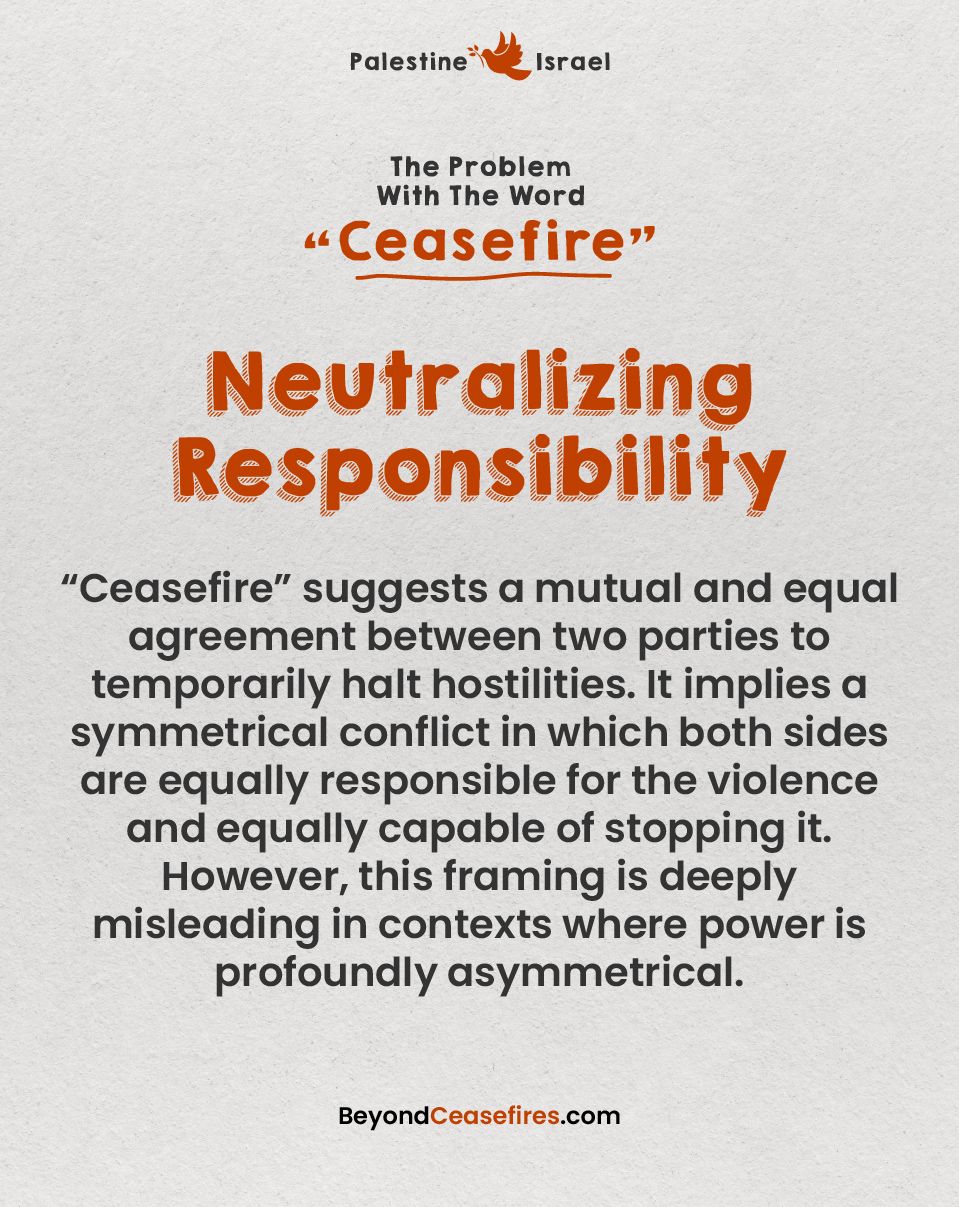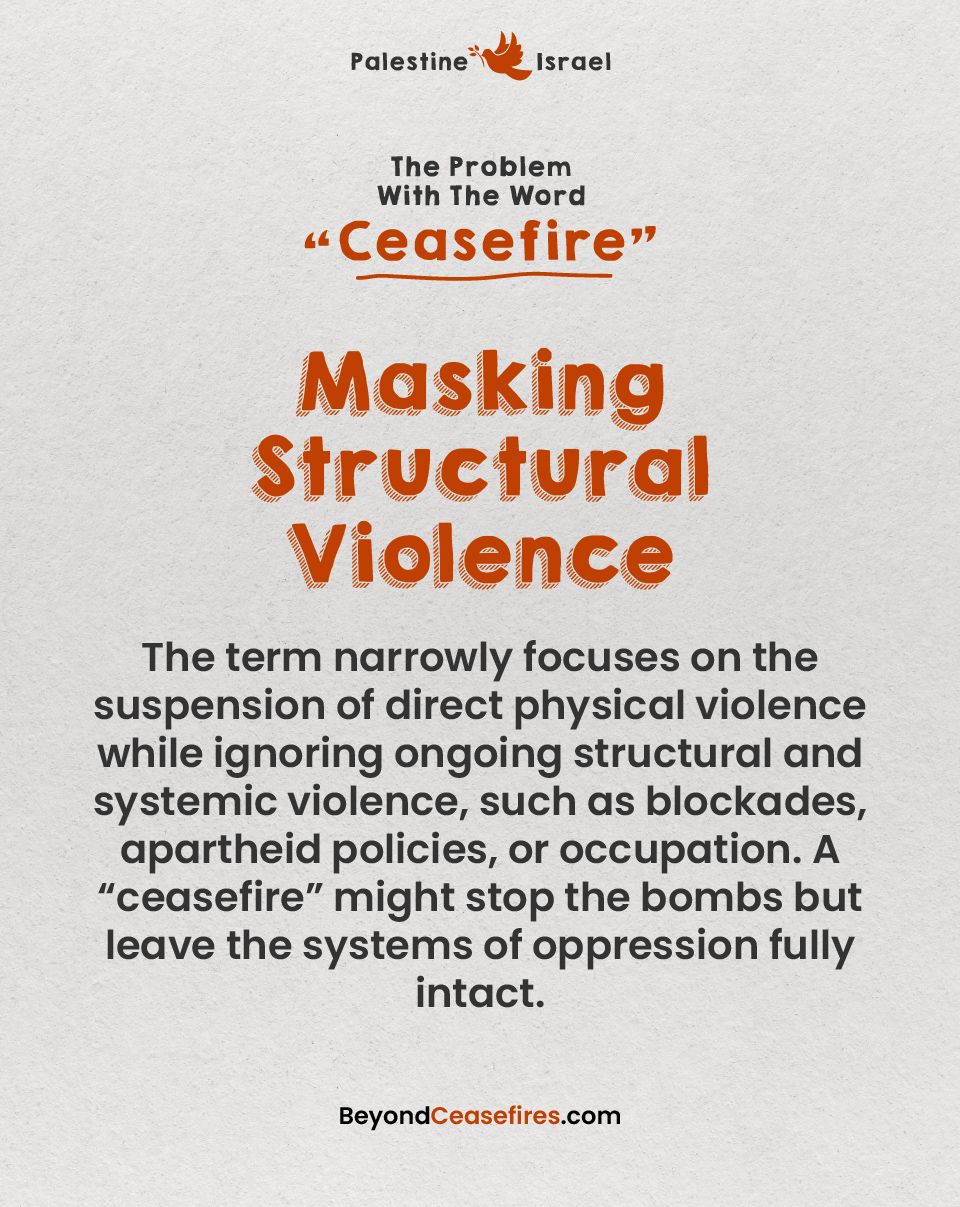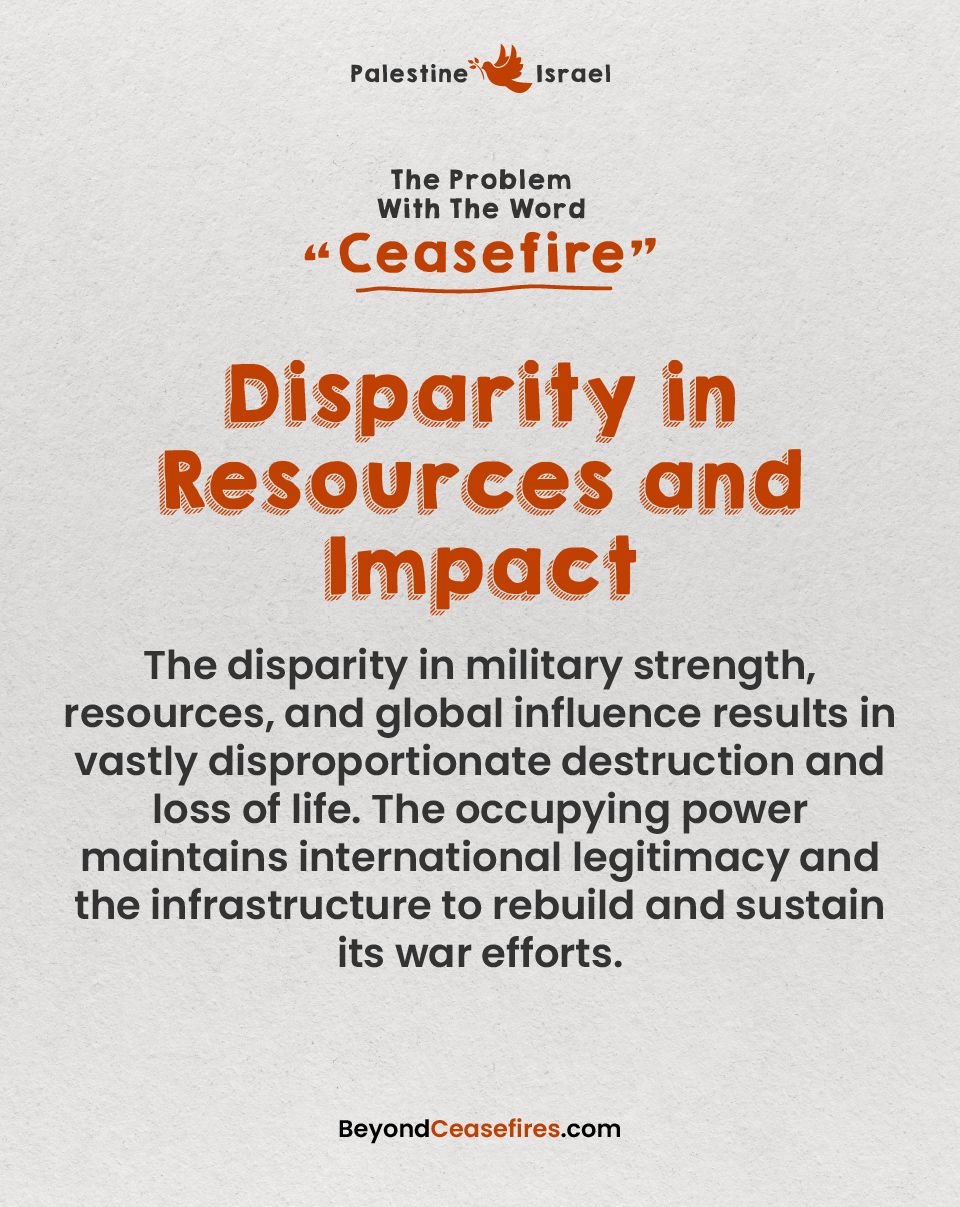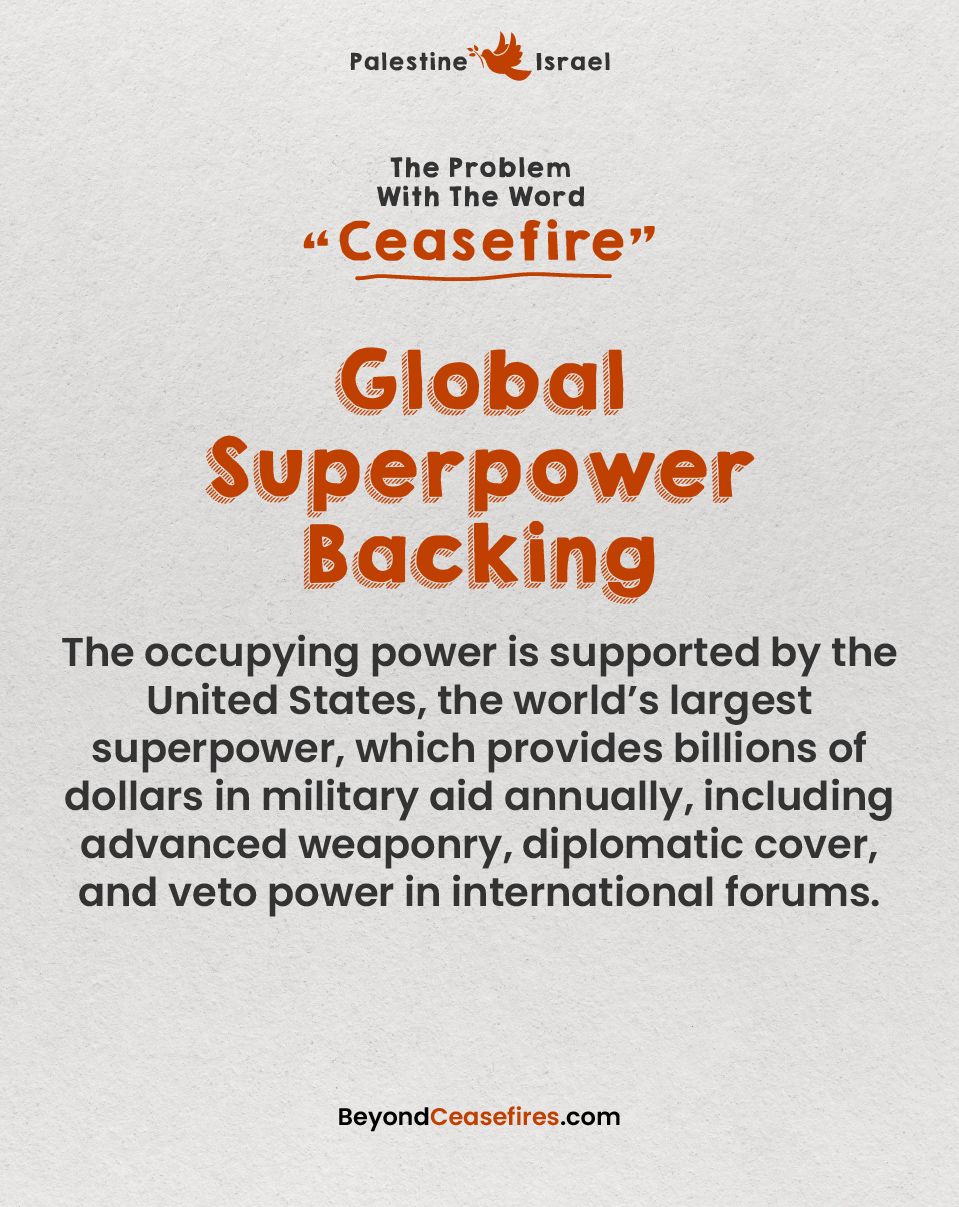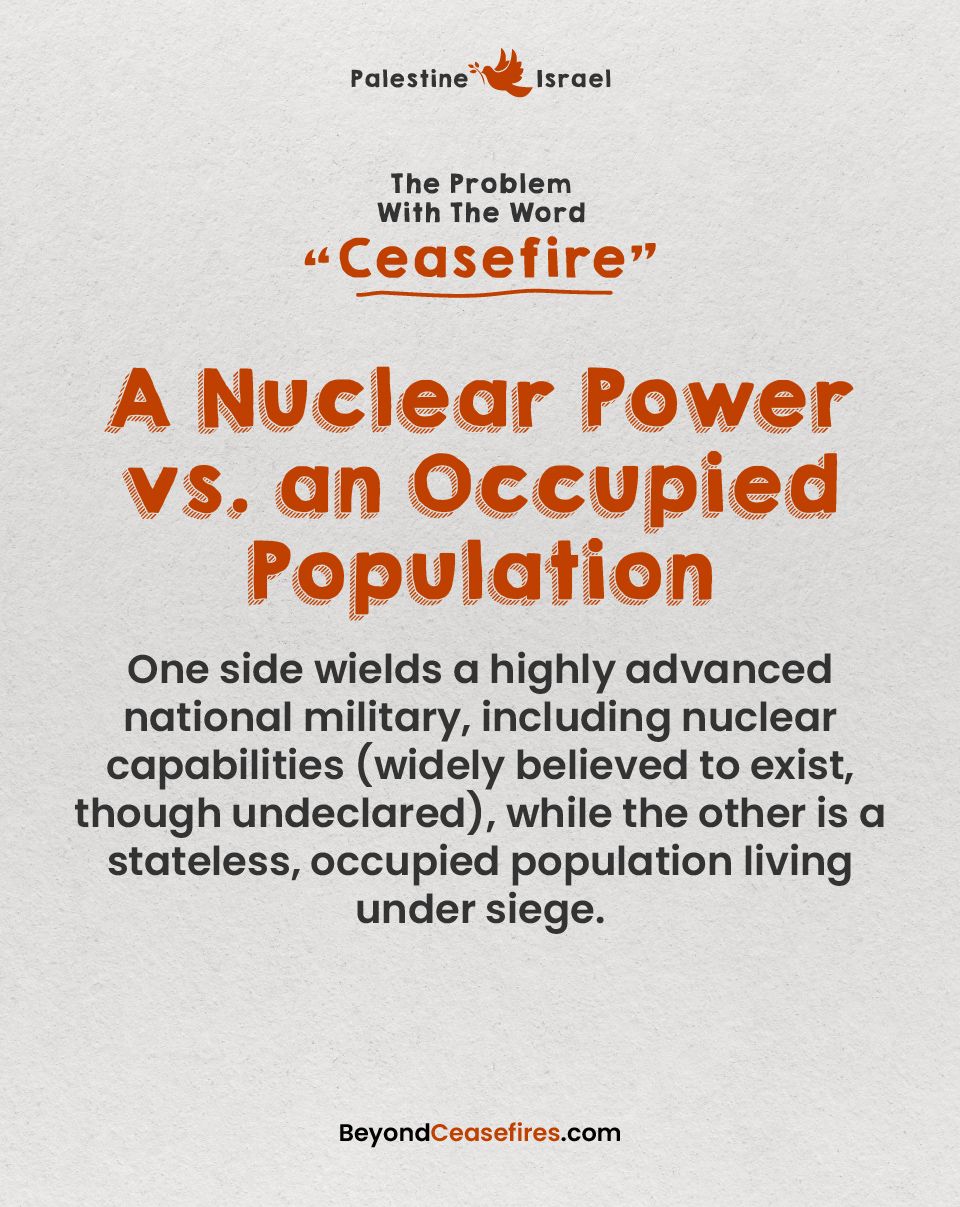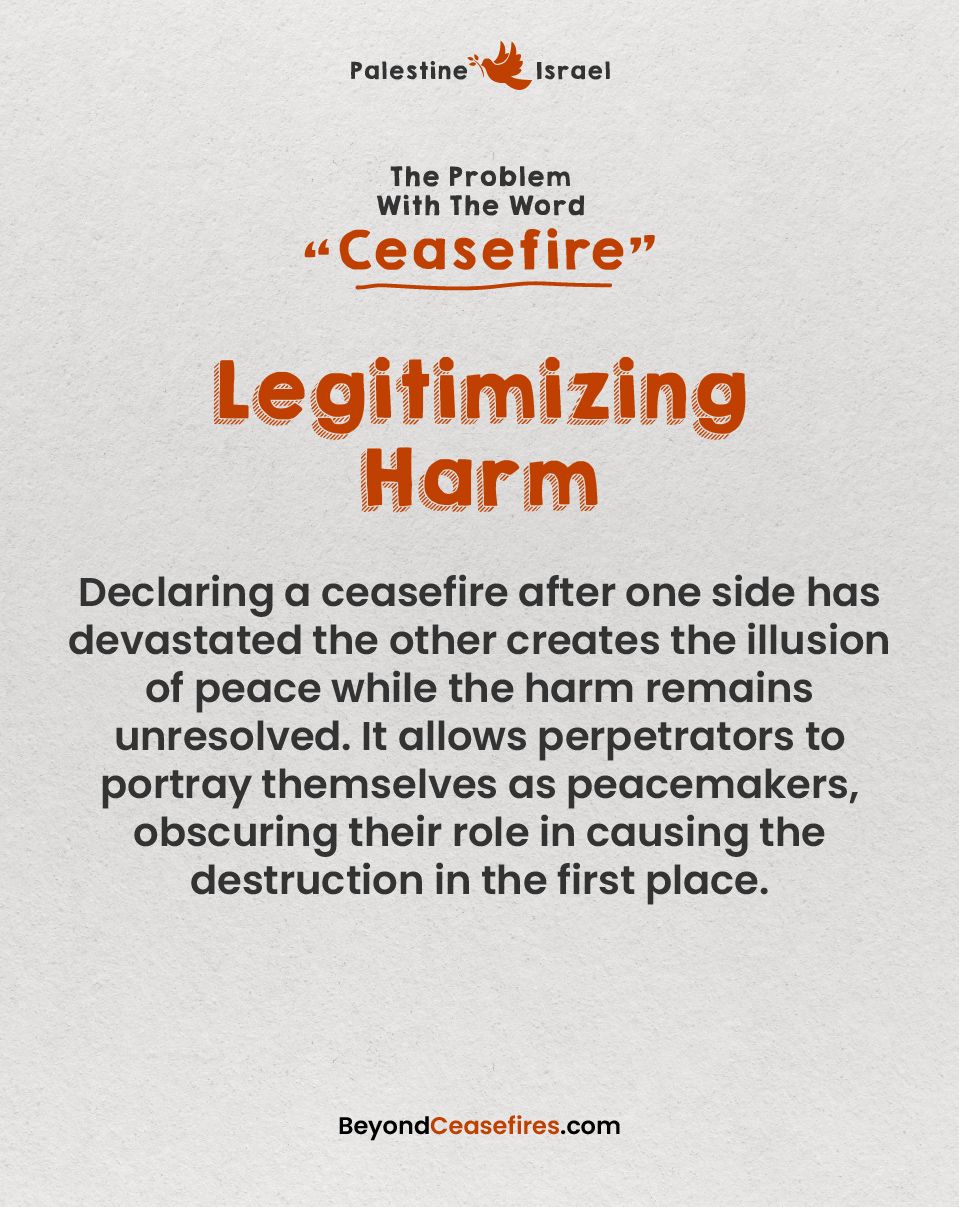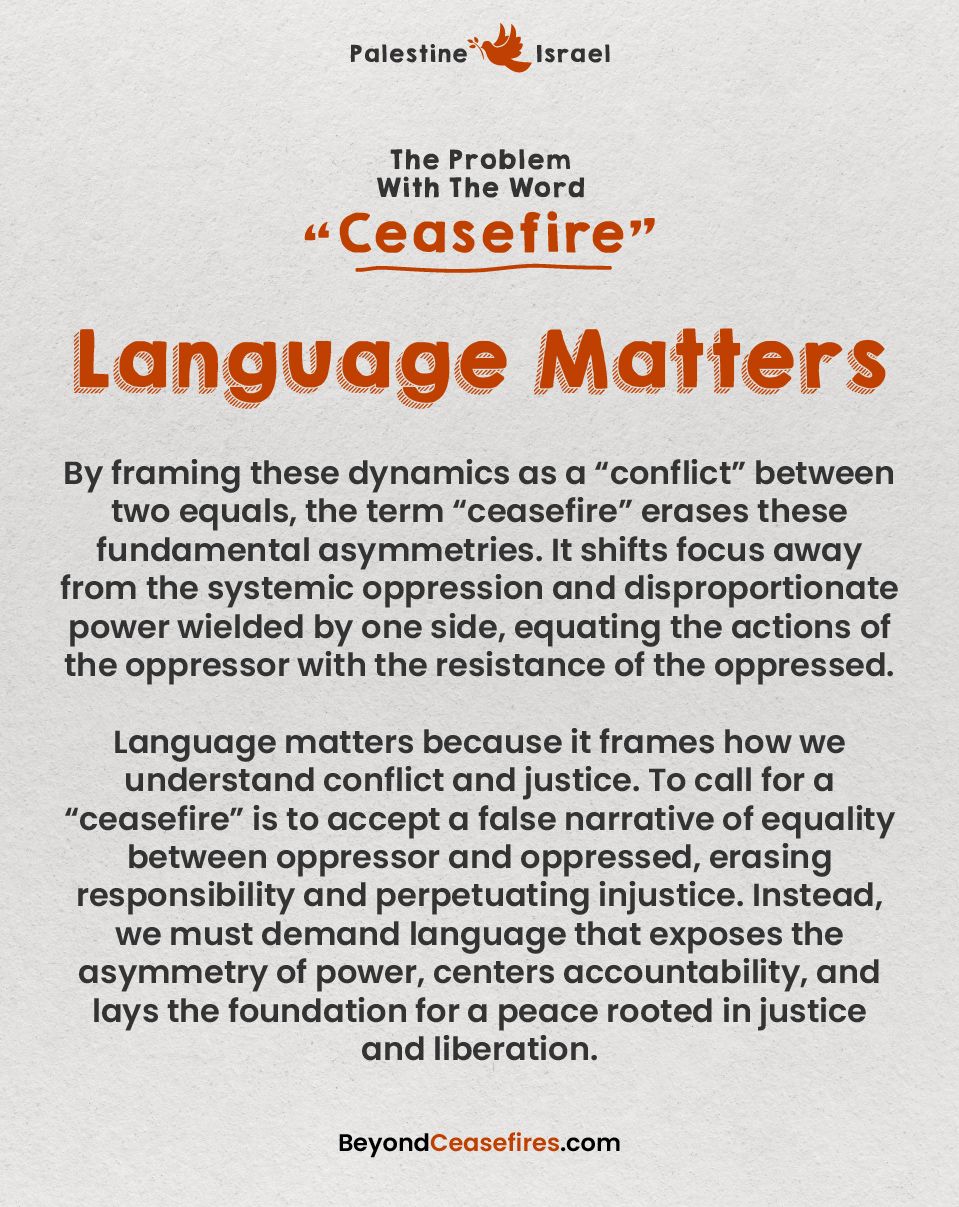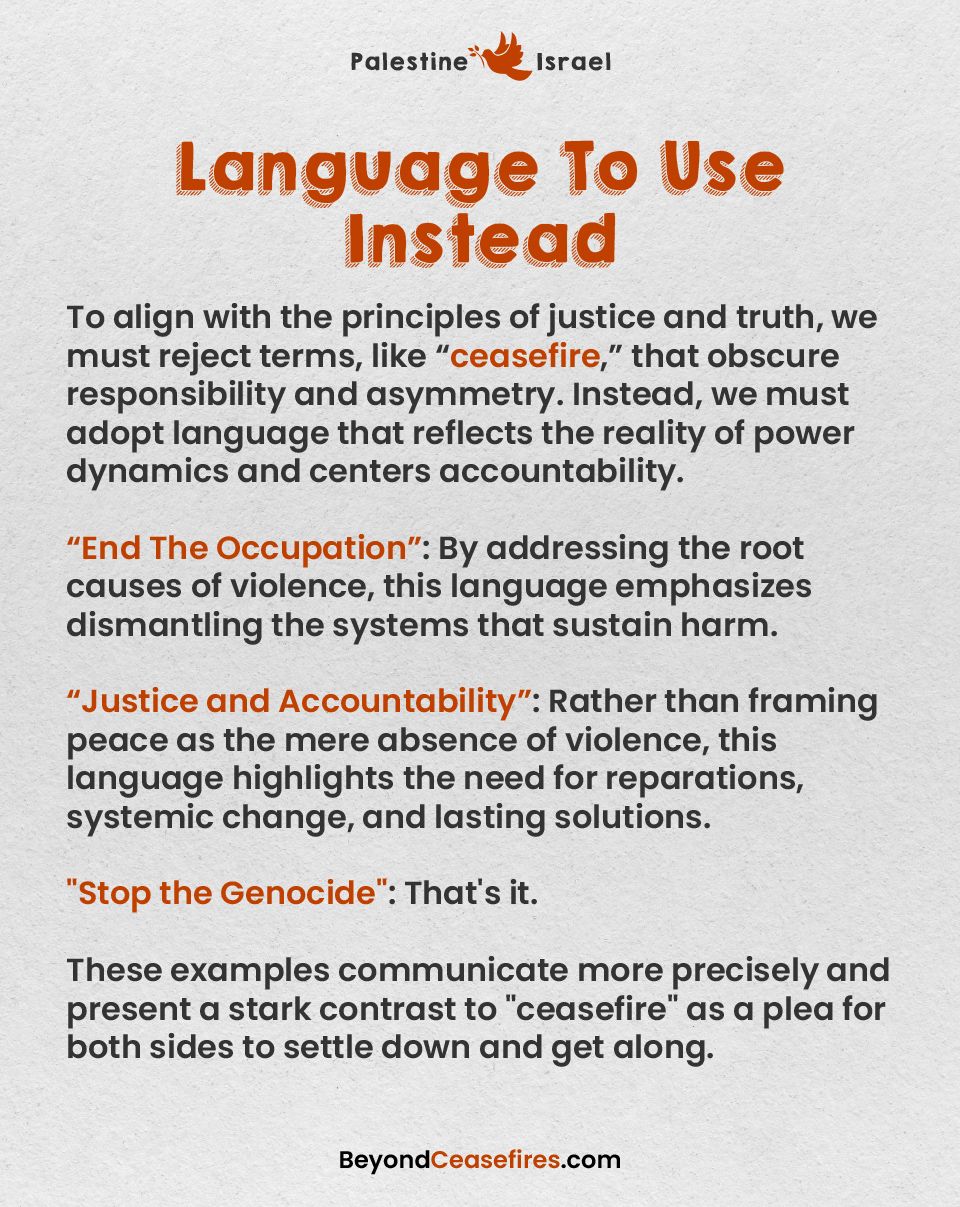
Beyond
Ceasefires
Unlocking Peace & Breaking the Cycle
(So-called) Ceasefires are not the end.
Justice and accountability must drive the path forward.
Justice and Peace for Everyone
V1.5 (last updated 01/22/2025)
Beyond
Ceasefires
Unlocking Peace & Breaking the Cycle
(So-called) Ceasefires are not the end. Justice and accountability must drive the path forward.
Justice and Peace for Everyone
V1.5 (last updated 01/22/2025)
The Demands
The following demands outline clear, immediate responsibilities directed at those who perpetuate harm, as well as the broader systems of power and institutions complicit in sustaining injustice. These demands call for accountability, systemic change, and justice from governments, international bodies, corporations, and all entities with the capacity to uphold norms or correct the harms they have enabled.
1. Ceasefire End Direct Military Aggression
Direct military aggression and systemic violence must not be temporarily paused or serve as a window to strategically regroup for a later phase of violence; it must end permanently. This requires an immediate halt to military aggression, collective punishment, and systemic violence, alongside a complete cessation of weapons sales and transfers.
2. Lift the Siege
Ending direct violence while maintaining other forms of oppression is not an acceptable resolution. In addition to restoring basic utilities such as water and electricity, the free and normalized movement of goods, services, and people must be guaranteed.
3. Prioritize Unrestricted Humanitarian Aid
4. End the Occupation
Ending the occupation is more than removing checkpoints or retreating from illegal settlements; it demands dismantling the entire system of control and oppression that sustains the occupation.
5. Free Palestine
Dismantle apartheid. All citizens, regardless of ethnicity or religion, must enjoy full freedom, equal rights, and the ability to live under their elected representatives.
6. Release Hostages
Hostages on both sides must be released, including Palestinian detainees and political prisoners—men, women, and children—who have been illegally detained (in many cases for years).
7. Prosecute Humanitarian and War Crimes
Accountability cannot end with a ceasefire. Governments, officials, corporations, and financial institutions responsible for violations of international and humanitarian law must be held accountable. This includes divesting from harmful partnerships and terminating support for entities complicit in occupation, apartheid, and war crimes. Journalists and independent investigators must have full, unrestricted access to the region to document events and ensure transparency.
8. Repair Destruction
Infrastructure, facilities (hospitals, schools, etc.), farmland, housing, and other essentials must be rebuilt. Those responsible for destruction must bear the cost of reconstruction. Rebuilding efforts must center Palestinian agency and priorities, allowing them to determine how and what to rebuild. Aid should empower Palestinians to choose their partners in reconstruction, excluding the perpetrators of destruction from profiting from recovery efforts.
9. Pay Reparations
Not everything destroyed can be rebuilt—historical sites, libraries, art, and artifacts are irreplaceable. Reparations must address the catastrophic loss of livelihoods, opportunities, and cultural heritage. Those responsible must not only provide financial reparations but also divest from systems and structures that perpetuate harm, redirecting resources to rebuilding and justice. Reparations must also include ending the financial and material flows that sustain oppression.
10. Uphold the Right of Return
11. Establish a Reconciliation Agenda
A reconciliation agenda must be an immediate priority to foster long-term peace, healing, and coexistence. This agenda should aim to bridge divisions, address historical grievances, and prevent future violence, laying the foundation for a shared future.
Review
1. Ceasefire End Direct Military Aggression
Direct military aggression and systemic violence must not be temporarily paused or serve as a window to strategically regroup for a later phase of violence; it must end permanently. This requires an immediate halt to military aggression, collective punishment, and systemic violence, alongside a complete cessation of weapons sales and transfers.
2. Lift the Siege
Ending direct violence while maintaining other forms of oppression is not an acceptable resolution. In addition to restoring basic utilities such as water and electricity, the free and normalized movement of goods, services, and people must be guaranteed.
3. Prioritize Unrestricted Humanitarian Aid
4. End the Occupation
Ending the occupation is more than removing checkpoints or retreating from illegal settlements; it demands dismantling the entire system of control and oppression that sustains the occupation.
5. Free Palestine
Dismantle apartheid. All citizens, regardless of ethnicity or religion, must enjoy full freedom, equal rights, and the ability to live under their elected representatives.
6. Release Hostages
Hostages on both sides must be released, including Palestinian detainees and political prisoners—men, women, and children—who have been illegally detained (in many cases for years).
7. Prosecute Humanitarian and War Crimes
Accountability cannot end with a ceasefire. Governments, officials, corporations, and financial institutions responsible for violations of international and humanitarian law must be held accountable. This includes divesting from harmful partnerships and terminating support for entities complicit in occupation, apartheid, and war crimes. Journalists and independent investigators must have full, unrestricted access to the region to document events and ensure transparency.
8. Repair Destruction
Infrastructure, facilities (hospitals, schools, etc.), farmland, housing, and other essentials must be rebuilt. Those responsible for destruction must bear the cost of reconstruction. Rebuilding efforts must center Palestinian agency and priorities, allowing them to determine how and what to rebuild. Aid should empower Palestinians to choose their partners in reconstruction, excluding the perpetrators of destruction from profiting from recovery efforts.
9. Pay Reparations
Not everything destroyed can be rebuilt—historical sites, libraries, art, and artifacts are irreplaceable. Reparations must address the catastrophic loss of livelihoods, opportunities, and cultural heritage. Those responsible must not only provide financial reparations but also divest from systems and structures that perpetuate harm, redirecting resources to rebuilding and justice. Reparations must also include ending the financial and material flows that sustain oppression.
10. Uphold the Right of Return
11. Establish a Reconciliation Agenda
A reconciliation agenda must be an immediate priority to foster long-term peace, healing, and coexistence. This agenda should aim to bridge divisions, address historical grievances, and prevent future violence, laying the foundation for a shared future.
Framework of Demands:
Essential Steps for Justice and Accountability
The demands outlined focus on immediate, actionable responsibilities directed at perpetrators, their allies, and systems of power responsible for violence, occupation, and oppression. Each step reflects a demand to correct harm, dismantle unjust systems, and establish accountability, prioritizing those with the resources and responsibility to effect change. This framework is rooted in universal moral and legal principles, ensuring its demands are inarguable and universally defensible.
Method for Selection
Each demand is directed at the systems, institutions, and individuals with the greatest culpability for perpetuating violence, oppression, and systemic harm. The framework intentionally avoids placing the burden of change on individuals or communities who have no direct role in these atrocities.
While most actions address immediate responsibilities—ending violence, restoring rights, and rebuilding infrastructure—the framework also includes foundational mechanisms, such as prosecuting war crimes and establishing reconciliation agendas, that begin the process of structural transformation. These mechanisms function alongside immediate actions to ensure lasting change.
Every action leverages mechanisms of accountability and redress that involve those responsible for perpetuating or enabling harm. Whether halting violence, lifting sieges, or divesting from systems of oppression, the framework emphasizes direct, systemic intervention to achieve immediate relief and long-term justice.
Boycotting and Divestment
Boycotting is a valid and impactful grassroots tool of resistance, mobilizing individuals to challenge unjust systems and amplify demands for justice. However, boycotts place the burden of action on individuals and communities outside the structures of power. This framework excludes such demands to maintain its focus on holding those directly responsible accountable for the harm they have caused.
This is not to diminish the role of individual and collective activism. Grassroots efforts, including boycotts, are vital for building global solidarity and sustaining pressure on institutions. While the framework itself targets systems of power, it recognizes and supports the value of grassroots activism in complementing these demands.
Divestment
Divestment is distinct from boycotting because it targets institutions, corporations, and governments that profit from or sustain systems of harm. Within this framework, divestment is integrated where it directly aligns with mechanisms of accountability:
- Under “Prosecute War and Humanitarian Crimes”: Governments, corporations, and financial institutions must be held accountable for their roles in perpetuating harm, including through divesting from harmful partnerships and ceasing support for entities complicit in war crimes and occupation.
- Under “Pay Reparations”: Reparations must also address systemic complicity, requiring divestment from the financial and material flows that sustain oppression, redirecting resources toward rebuilding and justice.
Acknowledging the Value of Individual and Collective Action
Language Matters
The Problem with “Ceasefire”
Masking Structural Violence
- The siege that blocks access to food, water, electricity, and medical supplies.
- The occupation that controls every aspect of daily life through checkpoints, walls, and apartheid policies.
- The dispossession and displacement of entire communities, sustained by illegal settlements and systemic injustice.
How Language Is Weaponized to Obscure Power and Responsibility
- By framing an overwhelming military campaign and occupation as a “conflict,” language suggests parity where none exists.
- By describing disproportionate violence as “clashes,” it minimizes the scale of harm and obscures accountability.
- By calling for a “ceasefire,” it implies equal culpability between aggressor and oppressed, while ignoring the structural violence and systemic oppression that continue unabated.
Language To Use Instead
- “End The Occupation”: By addressing the root causes of violence, this language emphasizes dismantling the systems that sustain harm. “
- Justice and Accountability”: Rather than framing peace as the mere absence of violence, this language highlights the need for reparations, systemic change, and lasting solutions.
- "Stop the Genocide": That's it.


